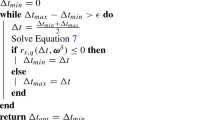Abstract
This paper develops a powerful new variant, dubbed \(\varDelta \)-DOGS(\(\varOmega _Z\)), of our Delaunay-based Derivative-free Optimization via Global Surrogates family of algorithms, and uses it to identify a new, low-storage, high-accuracy, Implicit/Explicit Runge–Kutta (IMEXRK) time integration scheme for the stiff ODEs arising in high performance computing applications, like the simulation of turbulence. The \(\varDelta \)-DOGS(\(\varOmega _Z\)) algorithm, which we prove to be globally convergent under the appropriate assumptions, combines (a) the essential ideas of our \(\varDelta \)-DOGS(\(\varOmega \)) algorithm, which is designed to efficiently optimize a nonconvex objective function f(x) within a nonconvex feasible domain \(\varOmega \) defined by a number of constraint functions \(c_\kappa (x)\), with (b) our \(\varDelta \)-DOGS(Z) algorithm, which reduces the number of function evaluations on the boundary of the search domain via the restriction that all function evaluations lie on a Cartesian grid, which is successively refined as the iterations proceed. The optimization of the parameters of low-storage IMEXRK schemes involves a complicated set of nonconvex constraints, which leads to a challenging disconnected feasible domain, and a highly nonconvex objective function; our simulations indicate significantly faster convergence using \(\varDelta \)-DOGS(\(\varOmega _Z\)) as compared with the original \(\varDelta \)-DOGS(\(\varOmega \)) optimization algorithm on the problem of tuning the parameters of such schemes. A low-storage third-order IMEXRK scheme with remarkably good stability and accuracy properties is ultimately identified using this approach, and is briefly tested on Burgers’ equation.






Similar content being viewed by others
Notes
Proofs of these properties are provided in §3 of [9].
A time marching scheme is said to be L-stable if its stability region contains the entire left-half plane (LHP), and \(\sigma (\infty ) = \lim _{z \rightarrow \infty } \sigma (z) = 0\).
References
Alimo, S., Beyhaghi, P., Meneghello, G., Bewley, T.: Delaunay-based optimization in cfd leveraging multivariate adaptive polyharmonic splines (maps). In: 58th AIAA/ASCE/AHS/ASC Structures, Structural Dynamics, and Materials Conference, p. 0129 (2017)
Alimo, S., He, D.: Multi-stage algorithm for uncertainty analysis of solar power forecasting. In: Power and Energy Society General Meeting (PESGM), pp. 1–5. IEEE (2016)
Alimo, S.R., Beyhaghi, P., Bewley, T.R.: Optimization combining derivative-free global exploration with derivative-based local refinement. In: Decision and Control (CDC), 2017 IEEE 56th Annual Conference on, pp. 2531–2538. IEEE(2017)
Alimo, S.R., Beyhaghi, P., Bewley, T.R.: Delaunay-based derivative-free optimization via global surrogates. Part III: nonconvex constraints J. Glob. Optim. (2019). https://doi.org/10.1007/s10898-019-00854-2
Alimo, S.R., Beyhaghi, P., Bewley, T.R.: Delaunay-based global optimization in nonconvex domains defined by hidden constraints. In: Andrés-Pérez, E., González, L., Periaux, J., Gauger, N., Quagliarella, D., Giannakoglou, K. (eds.) Evolutionary and Deterministic Methods for Design Optimization and Control With Applications to Industrial and Societal Problems, pp. 261–271. Springer, Cham (2019)
Audet, C., Dennis, J.E.: Mesh adaptive direct search algorithms for constrained optimization. SIAM J. Optim. 17(1), 188–217 (2006)
Beyhaghi, P., Bewley, T.: Implementation of cartesian grids to accelerate delaunay-based derivative-free optimization. J. Glob. Optim. 69(4), 927–949 (2017)
Beyhaghi, P., Bewley, T.R.: Delaunay-based derivative-free optimization via global surrogates, part ii: convex constraints. J. Glob. Optim. 66(3), 383–415 (2016)
Beyhaghi, P., Cavaglieri, D., Bewley, T.: Delaunay-based derivative-free optimization via global surrogates, part I: linear constraints. J. Glob. Optim. 66(3), 331–382 (2016)
Butcher, J.: Numerical Methods for Ordinary Differential Equations. Wiley, Hoboken (2008)
Calvo, M., de Frutos, J., Novo, J.: Linearly implicit Runge-Kutta methods for advection–reaction–diffusion equations. Appl. Num. Math. 37(4), 535–549 (2001)
Cavaglieri, D., Bewley, T.: Low-storage implicit/explicit Runge-Kutta schemes for the simulation of stiff high-dimensional ODE systems. J. Comput. Phys. 286, 172–193 (2015)
Cavaglieri, D., Beyhaghi, P., Bewley, T.: Low-storage imex runge-kutta schemes for the simulation of navier-stokes systems. In: 21st AIAA Computational Fluid Dynamics Conference, p. 3094 (2013)
Dormand, J., Prince, P.: A family of embedded Runge-Kutta formulae. J. Comput. Appl. Math. 6(1), 19–26 (1980)
Gill, P.E., Murray, W., Saunders, M.A., Wright, M.H.: Inertia-controlling methods for general quadratic programming. SIAM Rev. 33(1), 1–36 (1991)
Kennedy, C., Carpenter, M.: Additive Runge-Kutta schemes for convection-diffusion-reaction equations. Technical report, NASA Tech. Rep. (2001)
Kennedy, C., Carpenter, M., Lewis, R.: Additive Runge-Kutta schemes for convection-diffusion-reaction equations. Appl. Num. Math. 44, 139–181 (2003)
Kim, J., Moin, P.: Application of a fractional-step method to incompressible Navier–stokes Equations. J. Comput. Phys. 59, 308–323 (1985)
Kim, J., Moin, P., Moser, B.: Turbulence statistics in fully developed channel flow at low Reynolds number. J. Fluid Mech. 177, 133–166 (1987)
Kubatko, E.J., Yeager, B.A., Ketcheson, D.I.: Optimal strong-stability-preserving runge-kutta time discretizations for discontinuous galerkin methods. J. Sci. Comput. 60(2), 313–344 (2014)
Le, H., Moin, P.: An improvement of fractional step methods for the incompressible Navier–Stokes equations. J. Comput. Phys. 92, 369–379 (1991)
MATLAB. version 8.6.0 (R2015b). The MathWorks Inc., Natick, Massachusetts (2015)
Spalart, P., Moser, R., Rogers, M.: Spectral methods for the Navier–Stokes equations with one infinite and two periodic directions. J. Comput. Phys. 96(2), 297–324 (1991)
Wray, A.A.: Minimal storage time advancement schemes for spectral methods. NASA Ames Research Center, California, Report No. MS 202 (1990)
Zhao, M., Alimo, S.R., Bewley, T.R.: An active subspace method for accelerating convergence in delaunay-based optimization via dimension reduction. In: 2018 IEEE 57th Annual Conference on Decision and Control (CDC). IEEE (2018)
Acknowledgements
The authors gratefully acknowledge Fred Y. Hadaegh, Rebecca Castano, David Hanks, Navid Dehghani, and Firouz M. Naderi for their support, and Sebastien Le Digabel for for his constructive feedback. The authors gratefully acknowledge funding from AFOSR FA 9550-12-1-0046, from the Cymer Center for Control Systems & Dynamics, from the Leidos corporation in support of this work. Also, the research was supported by the Jet Propulsion Laboratory, California Institute of Technology, under a contract with the National Aeronautics and Space Administration.
Author information
Authors and Affiliations
Corresponding author
Additional information
Publisher's Note
Springer Nature remains neutral with regard to jurisdictional claims in published maps and institutional affiliations.
Rights and permissions
About this article
Cite this article
Alimo, R., Cavaglieri, D., Beyhaghi, P. et al. Design of IMEXRK time integration schemes via Delaunay-based derivative-free optimization with nonconvex constraints and grid-based acceleration. J Glob Optim 79, 567–591 (2021). https://doi.org/10.1007/s10898-019-00855-1
Received:
Accepted:
Published:
Issue Date:
DOI: https://doi.org/10.1007/s10898-019-00855-1




